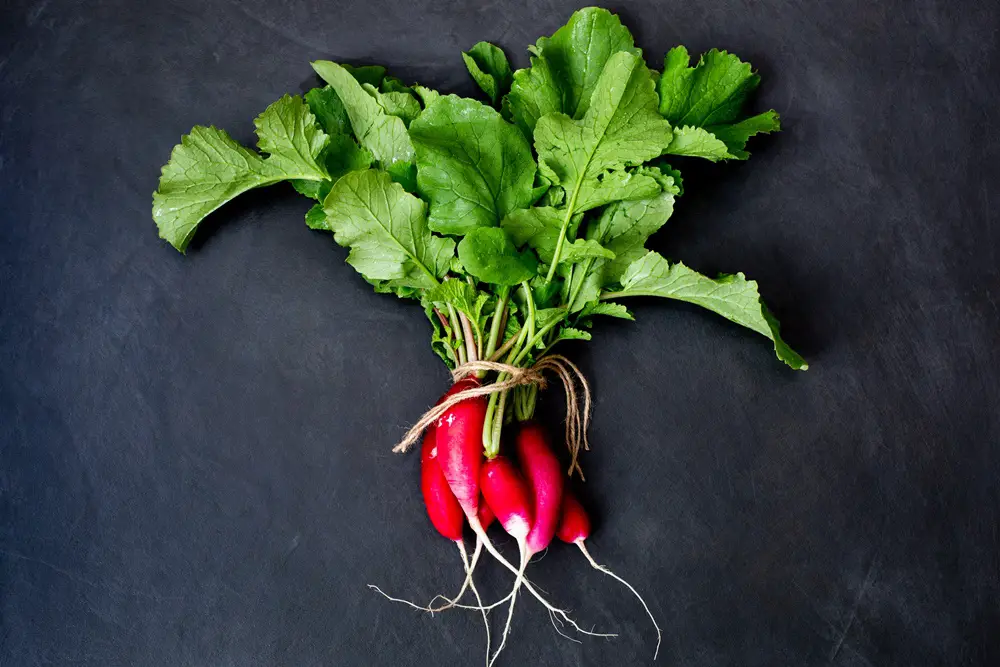Sometimes, you might get a little confused when choosing the foods for your beardies. If “Can bearded dragons eat radish greens?” is one of the questions you ask yourself, you are in the right place!
Radish greens can offer several benefits to bearded dragons when included as part of their balanced diet.
These leafy greens are rich in essential nutrients, including calcium, iron, vitamin C, and vitamin A.
Here, we will discuss radish greens and bearded dragons. You will know whether it is safe for you to feed these leaves to your pets.
Related Posts:
- Why Does My Beardie Stare at Me?
- Why Is My Beardie Closing Eyes When Stroked?
- How to Tell If Your Beardie Is Happy?
- Can Beardies Get High?
- Why Is My Beardie Breathing Heavy?
- Bearded Dragon Diet
- Reasons Why Your Beardie Turned White and Died
- 20+ Tips to Setup Beardie Tank
What Are Radish Greens?
Radishes have two main edible parts: the radish root and the radish greens.
Both parts contain vitamins A and C, calcium, iron, potassium, magnesium, phosphorus, manganese, zinc, etc.
But in the case of radish roots, once you cook them, the nutritional value will decrease.
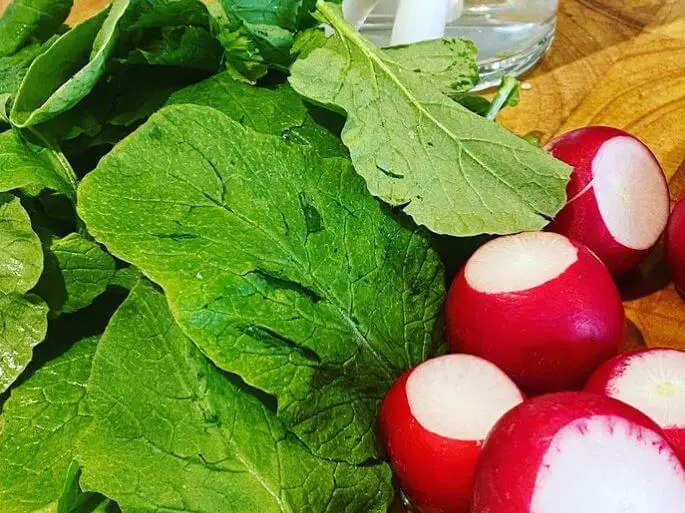
Bearded dragons will find the roots too hard to eat, so it is better to feed them the greens.
One of the primary benefits of radish greens is their high vitamin A content, which is great for bearded dragons’ vision and maintaining healthy skin.
When offering radish greens to bearded dragons, wash them thoroughly to remove any dirt or contaminants.
Can Bearded Dragons Eat Radish Greens?
Bearded dragons can eat radish greens safely without any challenge. However, they should consume it in small quantities.
Including radish greens in a bearded dragon’s diet adds variety and ensures they receive a balanced nutritional intake.
Below are all the vitamins and minerals your beardies can get from them per 100 grams.
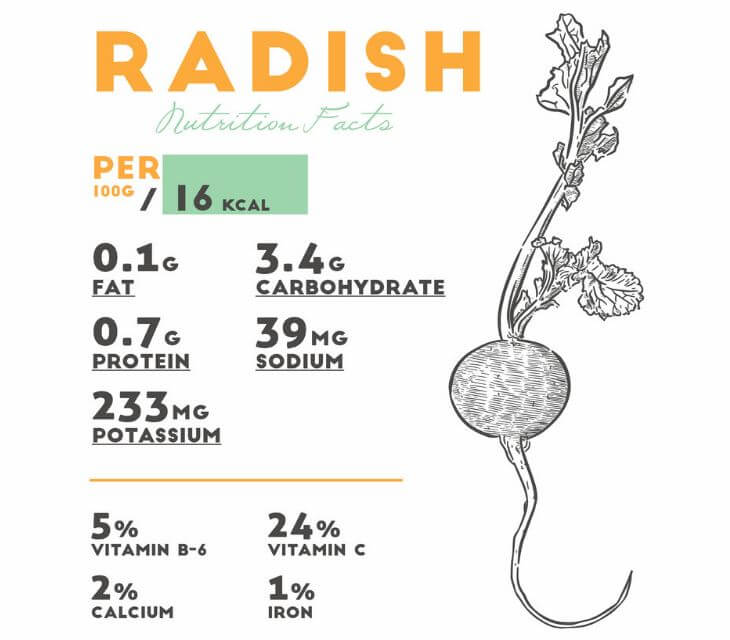
1. Vitamin C
Vitamin C will help your beardie keep a healthy body and great skin. It also boosts their digestive systems. When you give them radish greens with citrus fruits, you don’t need additional vitamin C supplements.
2. Vitamin B6
Vitamin B6 is connected with the nervous system and the functioning of muscles.
If your bearded dragon has insufficient amounts of vitamin B, it will lead to flaccid limbs and paralysis.
3. Magnesium
Magnesium is also an essential mineral nutrient in the beardie’s growth. It is responsible for the reptile’s skeletal development, verve function, and hormones.
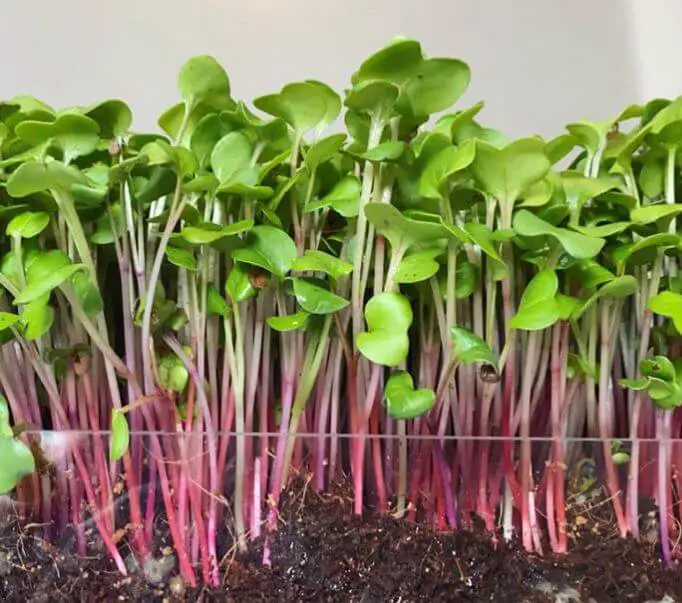
4. Phosphorus
Phosphorus helps with the breakdown of calcium in bearded dragons’ bodies.
If your lovely beardie lacks phosphorus in their diet, it will lead to a shortage of calcium, resulting in a malformed skeletal structure.
5. Iron
Iron is essential in preventing anemia and health problems caused by poor blood circulation.
However, you should be careful when adding iron to your pet’s diet as it will have a negative impact on their health if they get overdosed.
6. Calcium
Calcium is also a vital mineral for your pet because it supports the proper formation of their bones.
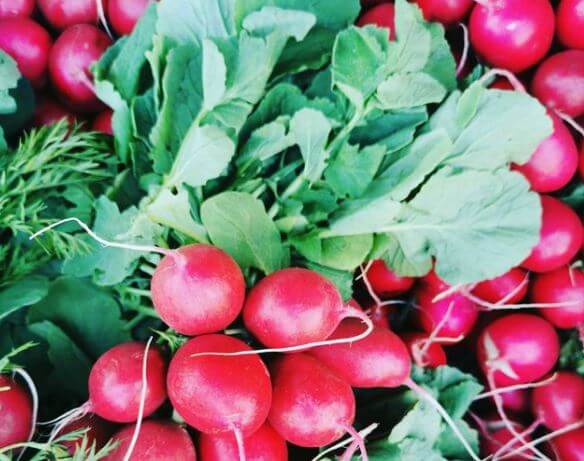
7. Vitamin A
Vitamin A has a positive effect on bearded dragons’ reproduction, skin, bones, and overall health. These reptiles store vitamin A in their bodies, so moderation is key.
8. Fiber
Radish contains fibers that support the proper functioning of the beardie’s digestive system. However, they are high in water but low in calcium content.
If you feed them radish greens often, it may lead to diarrhea or metabolic bone diseases because of inadequate calcium.
How to Feed Your Bearded Dragon With Radish Greens?
Radish greens contain minerals that might be bad for bearded dragons’ health if consumed in high amounts.
To ensure that your pet is safe, feed them radish greens less than three times per month.
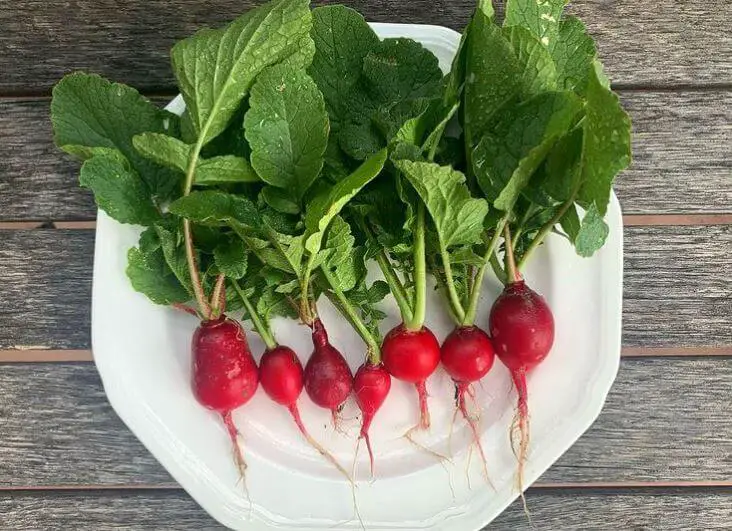
It has been said that bearded dragons can eat radish greens. Now, how can you incorporate them into their diet?
It is better to cut the leaves into small bits so that your pet can eat them quickly.
But note that if they haven’t tasted it before, they may reject them. You can try some of my tips below if this happens.
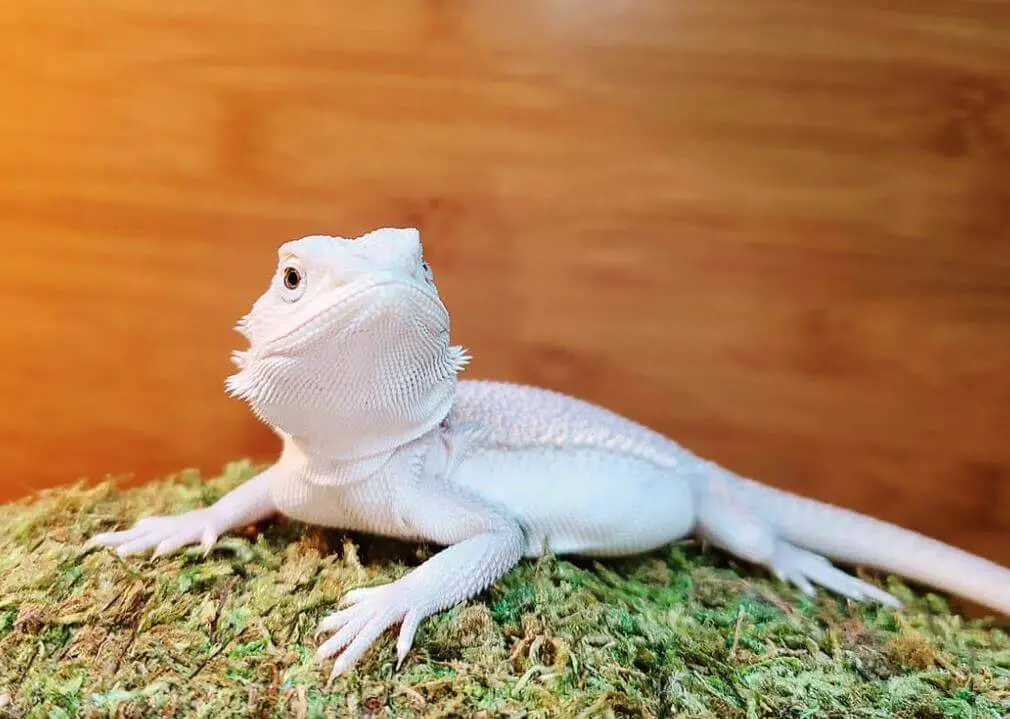
You can feed them the radish leaves as a snack instead of putting them in the salad.
Feeding them by hand is one way to make them interested in eating the new foods. You can try doing that.
If it doesn’t work, you can change the habit of giving food to your pet. You can leave it on the floor rather than in the bowl to encourage them to search through the food.
Once they get used to it, add it to the salad periodically to increase daily nutrition.
If you want to know more tips for feeding your pets with greens, watch this video!
Can Bearded Dragons Eat Cooked Radish?
Radish greens are the leafy, green tops of radish plants. These greens are edible and can be consumed by humans and some animals, including bearded dragons.
If you are wondering if bearded dragons can also eat radish plants or roots, they can eat them. But the nutritional value will diminish once you cook it.
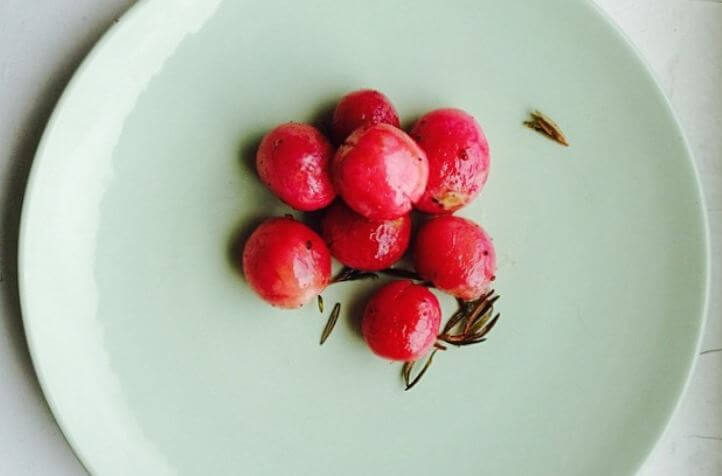
Radishes are useful when raw as it contains all nutrients. However, if you cook them, they will lose some essential nutrients or even all. Hence, the nutrition will go down.
If you are particular about feeding your bearded dragon food that is rich in vitamins and minerals, a cooked radish is not going to help.
Conclusion
As we have experienced so far, radish greens are safe and also healthy for beardies. But they have a peppery and slightly bitter taste, so some may not like the taste.
Regardless, radish greens are rich in nutrients and various minerals like calcium and iron. It will boost your pet’s health.
However, as with any new food, introduce radish greens gradually and monitor your bearded dragon’s response for effective results.
Key points for whether bearded dragons can eat radish greens:
Radish greens, the leafy tops of radishes, are often included in salads and various dishes. If you’re a bearded dragon owner, you might wonder if these greens are a suitable addition to your pet’s diet. Here’s what you need to know:
1. Nutritional Profile:
- Radish greens are rich in vitamins and minerals, including vitamin C, vitamin K, calcium, and folate.
2. Limited in Oxalates:
- Radish greens are relatively low in oxalates compared to some other leafy greens, making them a better choice for bearded dragons.
3. Balanced Diet:
- Bearded dragons require a balanced diet consisting of leafy greens, vegetables, and occasional fruits. Radish greens can contribute to this variety.
4. Feeding Frequency:
- Radish greens should be considered as part of a rotating diet and not the sole source of greens for your bearded dragon.
5. Preparing Radish Greens:
- Before offering radish greens to your bearded dragon, wash them thoroughly to remove any pesticides or contaminants.
6. Chopping or Shredding:
- Chop or shred the radish greens into small, manageable pieces to make it easier for your pet to eat.
7. Portion Control:
- Offer radish greens in moderation. They should constitute only a portion of the daily vegetable and greens intake.
8. Observe Dietary Preferences:
- Bearded dragons have individual dietary preferences. Some may enjoy radish greens, while others may not show interest. Observe your pet’s response.
9. Dietary Diversity:
- A diverse diet is essential for your bearded dragon’s overall health. Rotate radish greens with other safe leafy greens and vegetables to ensure balanced nutrition.
10. Caution with Spiciness: – Radish greens can have a slightly spicy or peppery flavor. While this isn’t harmful, some bearded dragons may be less inclined to eat them due to the taste.
11. Health Benefits: – The vitamins and minerals in radish greens can contribute to your bearded dragon’s overall health, including supporting their immune system and bone health.
12. Avoid Pesticides and Herbicides: – Bearded dragons are sensitive to chemicals. Ensure the radish greens you provide are organic and free of pesticides or herbicides.
13. Allergies and Reactions: – Introduce radish greens gradually into your bearded dragon’s diet. Some reptiles may have allergies or sensitivities to certain foods.
14. Monitor for Digestive Issues: – After feeding radish greens, monitor your bearded dragon for any digestive issues, such as diarrhea or constipation. Adjust their diet if needed.
15. Consult a Veterinarian: – If you’re unsure about introducing radish greens or any new food into your bearded dragon’s diet, consult a reptile veterinarian for guidance.
In summary, radish greens can be a nutritious addition to your bearded dragon’s diet when offered in moderation as part of a varied and balanced meal plan. Ensure they are prepared and served safely, and observe your pet’s preferences and digestive responses. As with any dietary changes, always prioritize the well-being of your bearded dragon and seek professional advice when needed.
Further Reading:
- Carolina Custom Cages Terrarium Review
- 8 Best Basking Rocks for Beardie: What Is the Best Choice?
- 10 Best Thermometers for Beardie: How to Choose the Best One?
- 5 Best Beardie Lighting Setups for Beardie Lovers
- 9 Best Heat Lamps for Beardie: Natural Habitat Provided

